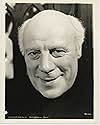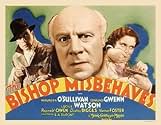Ajouter une intrigue dans votre langueOn a walking tour of English cathedrals, Donald Meadows meets Hester Granthem in church. Hearing he is from that hot-bed of crime, Chicago, Hester asks Donald to help her in a robbery she ha... Tout lireOn a walking tour of English cathedrals, Donald Meadows meets Hester Granthem in church. Hearing he is from that hot-bed of crime, Chicago, Hester asks Donald to help her in a robbery she has planned. Thinking it a joke, he plays along; but Hester is serious, and hearing that she... Tout lireOn a walking tour of English cathedrals, Donald Meadows meets Hester Granthem in church. Hearing he is from that hot-bed of crime, Chicago, Hester asks Donald to help her in a robbery she has planned. Thinking it a joke, he plays along; but Hester is serious, and hearing that she plans to rob Mr. Waller, the man who has cheated her father out of thousands of pounds, D... Tout lire
- Réalisation
- Scénario
- Casting principal
- Mr. Grantham
- (as Ivan Simpson)
- Commissionaire
- (scènes coupées)
- Percy Cloud, Man Reading Book
- (non crédité)
- Greek
- (non crédité)
- Office Man
- (non crédité)
Avis à la une
This is a splendid little crime comedy from MGM, sadly neglected, which boasts fine production values and, most especially, delightful performances from a small constellation of first-rate character actors.
Edmund Gwenn - in his American movie debut - is charming in the title role, a small, cherubic cleric who loves to read detective novels. Incisive & methodical, he misses very little and faces danger with bubbling enthusiasm. Watching him deal with an assortment of villains is great entertainment. Lucile Watson, as his elderly sister, also plays her part with a superb sense of fun.
As the romantic interests, Maureen O' Sullivan & Norman Foster add a fine comedic flair to their roles. Here's a pair of lovebirds who don't mind getting involved in theft & kidnapping - for a good cause. (Mr. Foster would eventually become a director of fine repute, associating with Orson Welles & Walt Disney.)
Reginald Owen makes a marvelous, blustery bad guy. Robert Greig, instead of portraying one of his usual plumy butlers, surprises as a Limehouse lowlife who enjoys needlepoint while plotting crimes. Clicking, chittering Etienne Girardot is hilarious as Gwenn's nervous amanuensis. Lilian Bond, Dudley Digges & Melville Cooper round out the excellent cast.
If only the Church of England could have more bishops like Edmund Gwenn...
Part 1 is a dopey love story, the kind of which seemingly thousands abound in Hollywood movies of the 30s and 40s. Norman Foster falls in love with a girl solely because of her looks. He feels that the way to win her is to be as grating, obnoxious and persistent as possible, essentially stalking her. Maureen O'Sullivan is cold, put off and off-putting, not the least bit interested, as she rightfully should be. But after knowing this clod who has no redeeming features whatsoever for a few hours, she is completely and permanently in love with him! I wonder if films like this are one reason the divorce rate is so high -- people thinking they should be like that, too.
Part 1 also contains some of the set-up for the other two parts, particularly Part 3. These portions are completely non-comedic. In fact, the only "comedy" at all in Part 1 is Foster's annoying antics. Gwenn is completely absent from this part.
O'Sullivan was clearly one of the women, like Norma Shearer, who was particularly targeted by the Hayes Code, among other things for her eye-popping nude scene in Tarzan the Ape Man (1932). Here she is quite the opposite, obviously on her best behavior. She wears high-necked blouses, and hardly shows even so much as a bare ankle! Much more businesslike than sexy.
Part 2 begins almost 30 minutes into the film with the entrance of Edmund Gwenn. He is good in everything I've ever seen him in (for a couple of more serious roles, I recommend Foreign Correspondent (1940) and Green Dolphin Street (1947)), but he is simply delightful here. And his sister, played by Lucile Watson, is even more so.
Part 2 is a wonderful comedy, unusual, fast-paced and full of plot twists. Gwenn is a bishop (Anglican, one supposes) who obviously spends more time reading detective novels than writing sermons. Watson is his sister, a strait-laced spinster, called in the opening credits, "fourteen times president of the Primrose League," without any further explanation of what that may mean. Contrary to what you might expect from such a woman, she is a full-bore thrill seeker, absolutely fearless, and nothing but highly entertained by all the exciting and dangerous situations that the film brings her.
Gwenn is like a kid in a candy store, tickled pink to have a chance to try out some of the tricks he has read about in the detective stories. Part 2 centers on his smooth, deft, savvy outsmarting of the criminals. It is absolutely hilarious! Foster and O'Sullivan are almost completely absent from this part, only coming in at the very end.
Part 3 ruined the movie for me. It is a straightforward rescue-the-kidnap-victims-from-the-gang-of-underworld-hoods movie. It is almost completely devoid of comedy, unless you count Gwenn's wrongfully being taken to a shelter for homeless skid row bums, which is only funny because such a thing is so absurd. There is certainly nothing comedic about the home, nor his stay there.
He does a complete volte face from his aplomb in Part 2. He screws up everything he touches. At the end, he is being severely chastised by all concerned, including himself. A downer ending to what is supposed to be a comedy!
Watson is absent from Part 3, as are Foster and O'Sullivan, largely. They spend more than half their on-screen time in this part tied up and gagged. The action centers on two rival gangs of thugs and Gwenn's involvement with them and the cops. The only stand-out in Part 3 is Lilian Bond, who appeared briefly in Part 1, a rich, snobbish moll who ends up being surprisingly respectable.
If the movie had all been like Part 2, I would have rated it a 9/10 and kept it. As it is, I taped over it.
E.A. DuPont's second American movie is a lively mystery from a stage play by Frederick J. Jackson, full of Hollywood's English colony acting against type (except for Gwenn's woolly-minded geniality), with more than a slight touch of screwball in it. Although it subsides into slightly more somber tones in the final third, it roars along at a great pace and shows that MGM's gloss could be well applied to lighter subjects without overwhelming them.
While this isn't a real laugh out loud film, I think you will giggle quite a bit.
The supporting cast is also fun. Reginald Owen is a cantankerous riot as usual.
The only bore is Maureen O'Sullivan but that is typical of her.
This was the height of MGMs screwball comedies. It was has a great cast, good writing and excellent direction. If they only made films like this today.
I cannot imagine anyone having fun with this film.
Le saviez-vous
- AnecdotesThe play originally opened in New York on 20 February 1935 at the Cort Theatre (renamed the James Earl Jones Theatre in 2022), 138 W. 48th St. and ran 121 performances. Walter Connolly played the bishop, and Jane Wyatt and Alan Marshall were the romantic leads.
- GaffesAfter Donald photographs, then meets Hester in church, he leaves to continue to take pictures. In the next scene, Donald's shadow can be seen on the backdrop as he takes more pictures.
- Citations
Donald: Everything would've been all right if you'd stayed where I told you.
Hester: And let you do it alone? That wouldn't be cricket.
Donald: Whaddya mean, "cricket"?
Hester: Wouldn't be sporting.
Donald: So you disclose your identity, stick your head behind prison bars just to make it cricket and sporting? You English give me a pain in the ear.
'Red': Hey, what's the matter with England, I'd like to know.
Donald: Nothing, it's the people that live in it.
'Red': Ehh.
Lady Emily: England's an acquired taste, but it's very pleasant.
Donald: Well, I only said -...
'Red': Well, England's good enough for me!
'Frenchy': You foreigners don't have to come over here, you know!
- Crédits fousThe five leads are billed at the top with optical credits giving not only their names but a brief description of their characters.
- ConnexionsVersion of The Bishop Misbehaves (1951)
- Bandes originalesAbide with Me
(1861) (uncredited)
Music by William H. Monk
Hymn by Henry F. Lyte (1847)
Sung a cappella by Etienne Girardot
Meilleurs choix
Détails
- Date de sortie
- Pays d’origine
- Langue
- Aussi connu sous le nom de
- The Bishop's Misadventures
- Lieux de tournage
- Société de production
- Voir plus de crédits d'entreprise sur IMDbPro
- Durée1 heure 25 minutes
- Couleur
- Rapport de forme
- 1.37 : 1
Contribuer à cette page






















